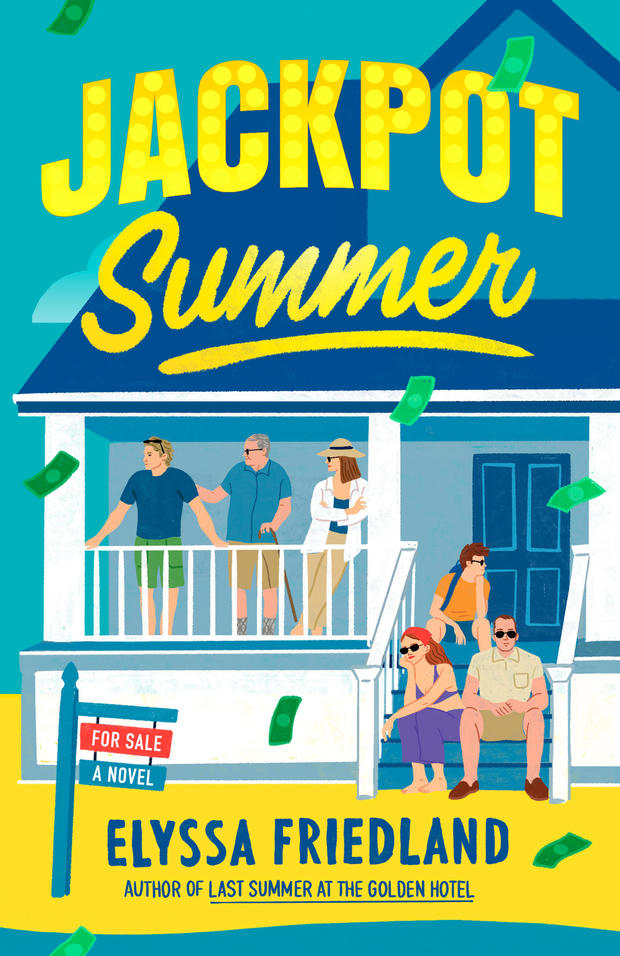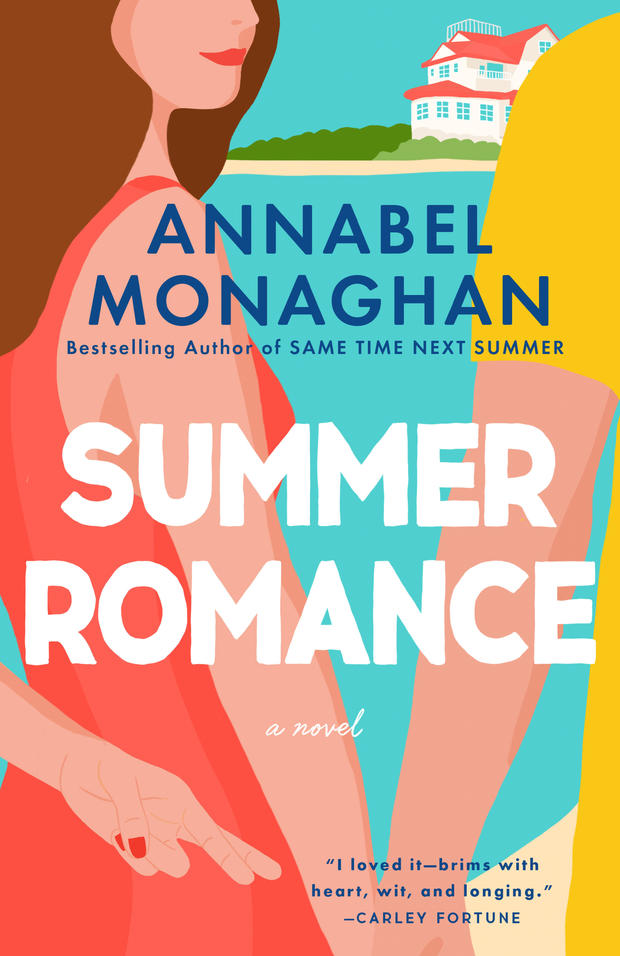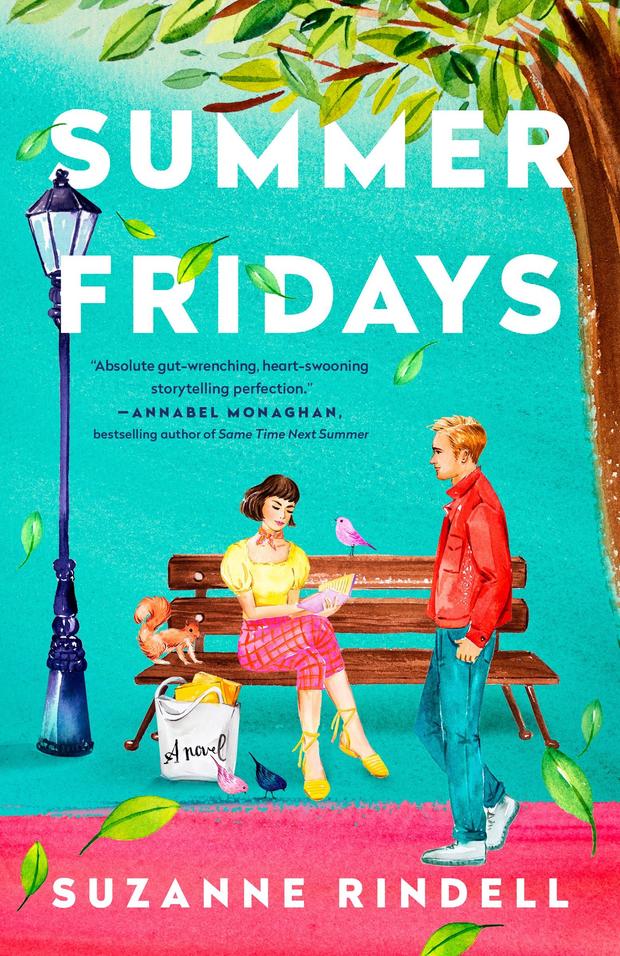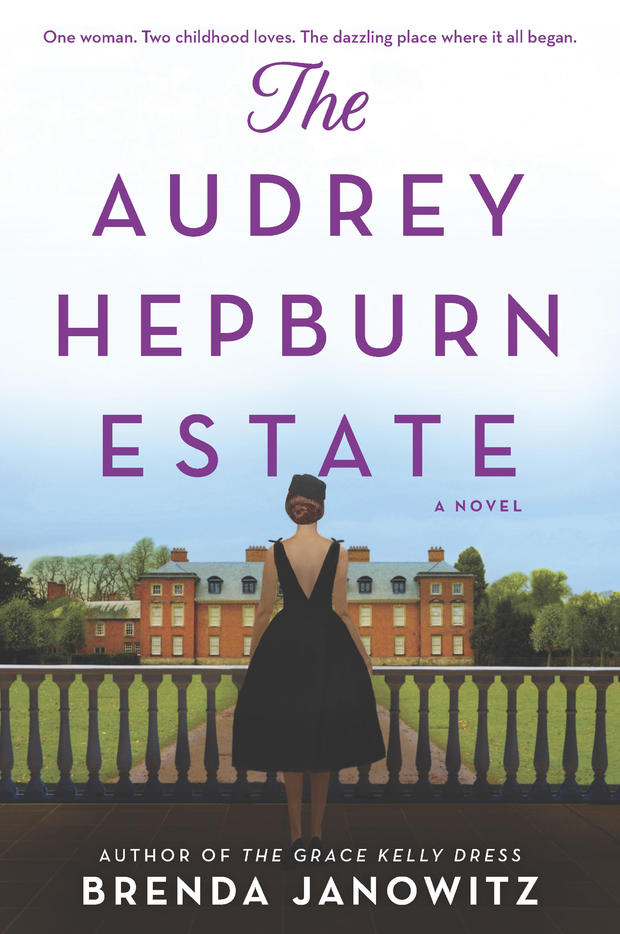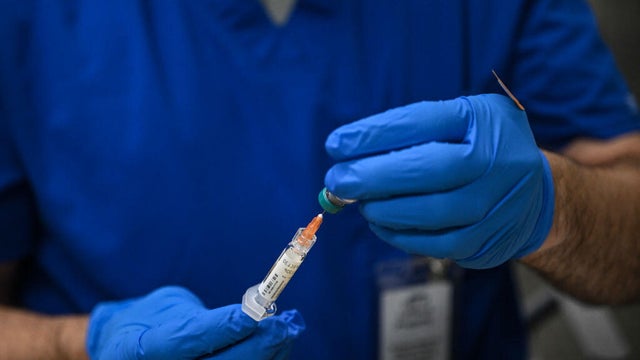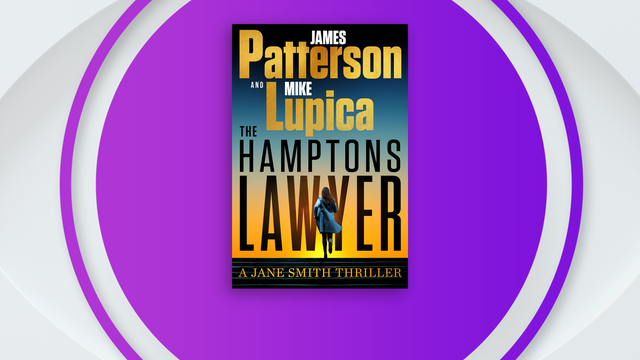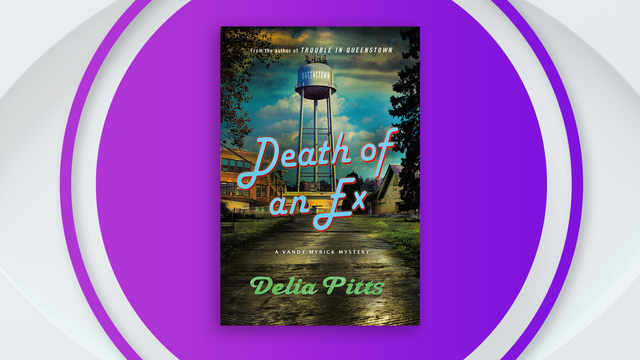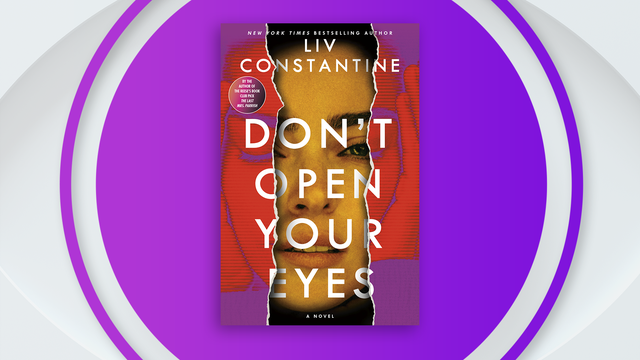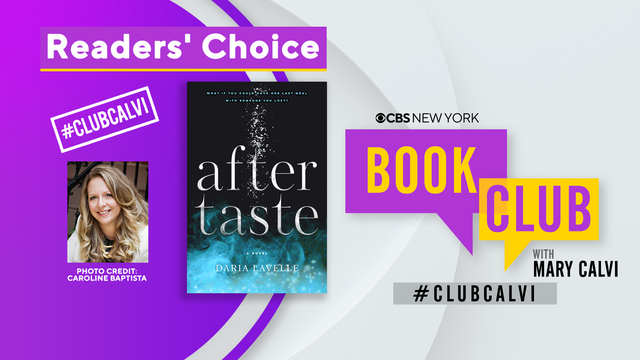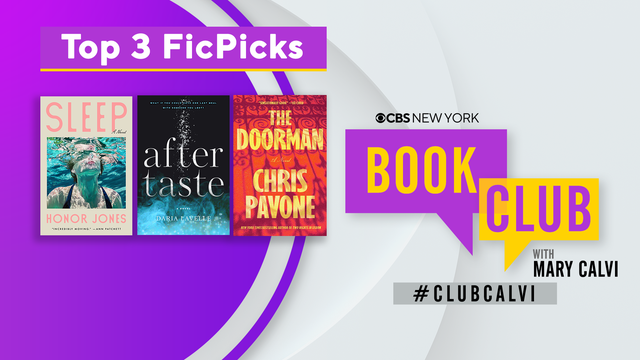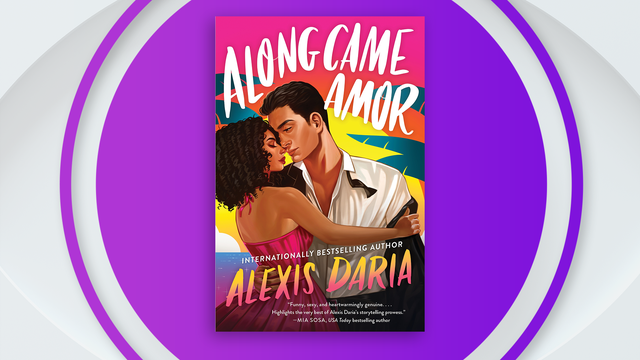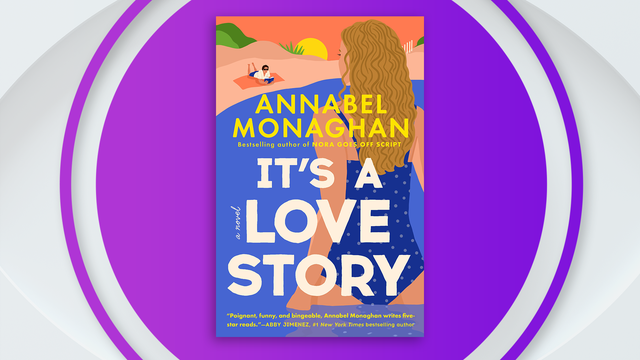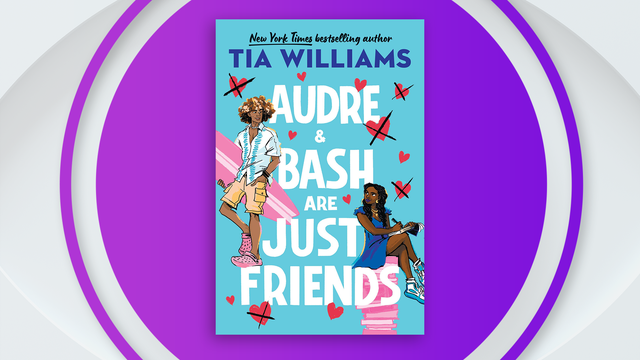Early summer reads for your beach bag, from the CBS New York Book Club
Please consider joining our Facebook group by CLICKING HERE.
Find out more about the books below.
Club Calvi has three early summer paperbacks for your reading list
As you read the CBS New York Book Club's current Readers' Choice "The Next Mrs. Parrish," here are three other books you also might want to pack in your beach bag.
Mary Calvi talked to Brenda Janowitz, author of the May 2023 Readers' Choice "The Audrey Hepburn Estate," about the new books that are connected to the tri-state area. Janowitz says all the books have humor, which is something you want in a beach read.
"Jackpot Summer" by Elyssa Friedland is about a family who gathers on the Jersey Shore and what happens to them after they win the lottery. Janowitz calls "Jackpot Summer" the ultimate summer fantasy novel. "Who doesn't want to win the lottery," she says. According to Janowitz, Friedland is known for her books about family drama and "Jackpot Summer" is no exception.
"Summer Romance" by Annabel Monaghan tells the story of a New York woman whose life is in chaos after her marriage hits the rocks, but then has a "meet cute" with a new man. Janowitz says "Summer Romance" is relatable as the main character is a working mother who is dealing with grief, with a divorce, and then something unexpected happens.
"Summer Fridays" by Suzanne Rindell is about a young engaged woman trying to make it in publishing in New York in the 1990s. The book is being called the "You got Mail" for a new generation. Janowitz says there's something nostalgic about the "Summer Fridays" and it has clever banter that brings back a specific place and time.
These books may have adult themes.
"Jackpot Summer" by Elyssa Friedland
From the publisher: The four Jacobson children were raised to respect the value of a dollar. Their mother reused tea bags and refused to pay retail; their father taught them to budget before he taught them to ride a bike. And yet, now that they're adults, their financial lives are in disarray.
The siblings reunite when their newly widowed father puts their Jersey Shore beach house on the market. Packing up childhood memories isn't easy, especially when there's other drama brewing. Matthew is miserable at his corporate law job and wishes he had more time with his son; Laura's marriage is imploding in spectacular fashion; Sophie's art career is stalled while her boyfriend's is on the rise; and Noah's total failure to launch has him doing tech repair for pennies.
When Noah sees an ad for a Powerball drawing, he and his sisters go in on tickets while their brother Matthew passes. All hell breaks loose when one of the tickets is a winner and three of the four Jacobsons become overnight millionaires. Without their mother's guidance, and with their father busy playing pickleball in a Florida retirement village, the once close-knit siblings search for comfort in shiny new toys instead of each other.
It's not long before the Jacobsons start to realize that they'll never feel rich unless they can pull their family back together.
Elyssa Friedland lives in New York City.
"Jackpot Summer" by Elyssa Friedland (Amazon) $17
"Jackpot Summer" by Elyssa Friedland (Kindle) $13
"Summer Romance" by Annabel Monaghan
From the publisher: Ali Morris is a professional organizer whose own life is a mess. Her mom died two years ago, then her husband left, and she hasn't worn pants with a zipper in longer than she cares to remember.
No one is more surprised than Ali when the first time she takes off her wedding ring and puts on pants with hardware-overalls count, right?-she meets someone. Or rather, her dog claims a man for her...by peeing on him. Ethan smiles at Ali like her pants are just right-like he likes what he sees. He looks at her like she's a younger, braver version of herself. The last thing newly single mom Ali needs is to make her life messier, but there's no harm in a little summer romance. Is there?
Annabel Monaghan lives in Rye, NY
"Summer Romance" by Annabel Monaghan (Amazon) $14
"Summer Romance" by Annabel Monaghan (Kindle) $13
"Summer Fridays" by Suzanne Rindell
From the publisher: Summer 1999: Twentysomething Sawyer is striving to make it in New York. Between her assistant job in publishing, her secret dreams of becoming a writer, and her upcoming wedding to her college boyfriend, her is plate full. Only one problem: She is facing an incredibly lonely summer as her fiancé has been spending longer and longer hours at work . . . with an all-too-close female colleague, Kendra.
When Kendra's boyfriend, Nick, invites Sawyer to meet up and compare notes about their suspicions, the meeting goes awry. She finds Nick cocky and cynical, and he finds her stuck in her own head. But then Nick seeks out Sawyer online to apologize, and a friendship develops.
Soon, Sawyer's lonely summer takes an unexpected turn. She and Nick begin an unofficial ritual-exploring New York City together every summer Friday. From hot dogs on the Staten Island Ferry and Sea Breezes in a muggy East Village bar to swimming at Coney Island, Sawyer feels seen by Nick in a way that surprises her. He pushes her to be braver. To ask for what she wants. Meanwhile, Sawyer draws Nick out of his hard shell, revealing a surprisingly vulnerable side. They both begin living for their Friday afternoons together. But what happens when the summer is over?
Suzanne Rindell divides her time between New York and California.
"Summer Fridays" by Suzanne Rindell (Amazon) $13
"Summer Fridays" by Suzanne Rindell (Kindle) $13
Excerpt: "Jackpot Summer" by Elyssa Friedland
The Star-Ledger
LONG BEACH ISLAND SIBLINGS AND A RUMSON GRANDMOTHER OF 12 WIN BIG SLICE OF POWERBALL PIE
Drama Surrounds Sibling Win
By Jeanette Espinosa
It's time for people to stop thumbing their noses at the Garden State. Making lottery history, two of the four winning tickets of a $261 million Powerball were claimed by New Jersey residents who purchased their winning tickets over July Fourth weekend. The chances of winning the Powerball jackpot are 1 in 292,201,338, so having two winners from New Jersey is quite the reason to celebrate. Sources in Governor Phil Murphy's office are saying a ticker-tape parade is under consideration.
Mabel Collins of Rumson, an eighty-two-year-old retired elementary school bus driver, took home over $30 million before taxes. She said she plans to use the money to help her local church and shower her twelve grandchildren with gifts.
"I'm at Target every day now buying gifts for my babies," Ms. Collins said. "It's constant Christmas over here."
The other New Jersey winner is a set of siblings with a family home in Beach Haven on the south end of Long Beach Island. The three siblings, whose last name is Jacobson, were quickly dubbed the Jackpot Jacobsons. The nickname has been adopted by the local summer community where the family has owned a home for more than three decades.
Unlike Ms. Collins, each of the Jacobson siblings declined to comment on the win. Public records show that Laura Jacobson is in contract to purchase a 7,000-square-foot home in upscale Franklin Lakes, New Jersey. Sister Sophie is listed on LinkedIn as a public school teacher in Brooklyn, but calls to the school indicate she is no longer employed there. The third sibling, Noah Jacobson, works as a private tech-support specialist but appears to have no official business or property registered to his name. One Beach Haven resident who wished to remain anonymous but described herself as a close family friend was not optimistic about the Jacobsons.
"Drama, drama, drama," she said. "That's all that winning the lottery has done for that poor family. Well, maybe poor isn't the right word."
1.
Sophie
"Well that was depressing," Sophie said. "I'm surprisingly hungry considering we were at Mom's grave less than ten minutes ago." She tilted the syrup dispenser and let it ooze over her pancake stack.
"I am too," Noah said, lifting a forkful of scrambled eggs. "But these eggs are awful compared to the ones at Chegg."
"You think everything is better at Chegg," Sophie said, referencing the Chicken or the Egg, one of the famous eateries on Long Beach Island.
"It is," the rest of the table responded, a chorus of voices that included Noah, Matthew, Laura, Laura's husband Doug and the patriarch of the Jacobson clan, Leo.
"For the hundredth time, you did not get food poisoning from Chegg," Laura said to Sophie, lowering the gigantic Kenilworth Diner menu she'd been using to hide her tear-streaked face. "You were puking because you drank too much of Dad's Chivas Regal. I saw you."
Leo raised an eyebrow at what apparently was coming as news to him.
Sophie considered Laura's claim. Maybe she had been conflating memories. The night of her alleged food poisoning was nearly twenty years ago.
"I thought the gravestone was very nice," Matthew, the oldest Jacobson sibling, said. His comment brought them back to why they were gathered in northern New Jersey on a sunny afternoon in June. It was for the unveiling of the gravestone marking the place their mother was buried. "I think Mom would have approved."
"She more than approved," Leo said, wiping Tabasco sauce from his mouth with a paper napkin. "She designed it."
The siblings' gasps quickly gave way to wry chuckling. They shouldn't have expected anything less from Sylvia Jacobson. Sophie considered the tombstone inscription with renewed appreciation, especially the line about canasta, the card game that was their mother's addiction.
Sylvia Rose Jacobson
February 6, 1947-June 30, 2023
Devoted Wife, Beloved Mother to the Fantastic Foursome, Book Lover, Volunteer, Jersey Girl
"Awaiting Special Hands in Heaven"
"Did I ever tell you that Mom emailed me a detailed description of what the girls and I should wear to her funeral, including accessories?" Laura said. "Oh, and that Doug shouldn't wear a navy tie."
"And I didn't. I wore yellow," Laura's husband said proudly.
"When she could barely speak anymore, she managed to mime that pink lipstick washes me out," Sophie said, puckering her burgundy-painted lips. "I listened too."
"I added the 'devoted' and 'beloved' to the inscription," Leo said. "She didn't want it to be too schmaltzy. This may be the first argument I ever won."
"I can definitely see her finding a regular canasta game in heaven," Sophie said. "Where she will win many special hands."
"Did anyone feel like they were waiting for directions from Mom today? Like where to stand, what to do," Matthew asked. "It's so weird to all be together and not have someone boss us around."
Sophie knew exactly what her brother was saying. She'd been staring at the plot of earth under which her mother lay buried, expecting a wagging finger to poke through the dirt.
Their mother had been the protective force field surrounding them at all times, instructing their next moves, sharing her opinions whether they were welcome or not. Even Leo took direction from his wife as though he were a fifth child. Sylvia's departure from this world one year earlier still gave Sophie the constant feeling that she was forgetting something, like leaving the house without her keys.
"At least we'll all be at the house for July Fourth weekend," Noah said. "Mom would like that."
The Jacobson family celebrating the Fourth of July together was a tradition dating to Sophie's childhood, when cousins and friends would gather at their summer house on Long Beach Island for the holiday weekend. Over the years, it grew to a full-blown daytime party with an overflowing buffet-almost all the dishes homemade by Sylvia-and concluded with the town fireworks. That Sylvia died just days before the holiday last year, forcing them to trade hot dogs, burgers and Sylvia's famous coleslaw for shiva platters of deli meats and rugelach that barely anyone touched, was especially painful.
"Excuse me," Beth said, waving a hand toward the diner's counter. Sophie noted it was the first time Matthew's wife had looked up from her phone since they'd sat down.
A waitress with a pencil behind her ear and a bored expression walked over with two steaming pots of coffee. "More joe? I got regular and decaf."
Beth shielded the top of her mug. "Not for me. I was wondering if you could provide the Wi-Fi password. The service in here is terrible."
The waitress wrinkled her nose. "Back in a minute."
"Sorry, I'm just absolutely slammed at work," Beth said. "I have to get a brief out within the hour."
"Does she ever stop?" Laura muttered to Sophie, jutting her chin in the direction of their sister-in-law. Sophie rolled her eyes in return.
"I found the air mattresses," Noah said, bringing the conversation back to the holiday weekend. "I'll have them pumped up before you guys get there."
"I call a real bed," Sophie said. "I'll have just finished teaching and need good sleep."
"That's fine. The girls and Austin will take the blowups," Laura said, referencing her two daughters and Matthew and Beth's son, the third-generation Jacobsons. "Doug too if his snoring keeps up."
"I don't snore," Doug said.
"Oh yes, you do."
"No, I don't."
"Okay, I'll record you."
"Fine, I'll try the damn nose strips again."
"He needs a CPAP machine," Laura said to her three siblings. Sophie shrugged. Luckily Ravi, her boyfriend of nearly two years, only snored when he drank too much. They spent just two nights together a week anyway.
"Miss! Miss!" Beth called out. Sophie followed Beth's flailing arms to where the waitress was schmoozing with a line cook behind the counter. "The Wi-Fi, please?"
Matthew turned to Beth. "Can't you finish up after lunch? We'll be back in the city in an hour."
Beth looked horrified. "Absolutely not. And don't you have to turn around that offering memorandum by EOD?"
So there were people who actually said EOD out loud, Sophie mused. She pinched Laura's knee at the same time Laura kicked Sophie's ankle under the table.
Matthew's expression shifted. "You're right. Let me go speak to the waitress." He left the table as Beth continued to jab at her phone, clearly frustrated to discover the Jersey diner wasn't as technically equipped as her law firm.
"I can probably hook you up to a hotspot," Noah said. The youngest Jacobson sibling had always been a technology whiz.
"Thanks. Tight deadline," Beth said as she handed over her phone to Noah. "In fact, we've got to head out soon anyway. Austin's in the last round of his chess tournament. He's up a rook in game seven."
Sophie gave Beth a thumbs-up, assuming "up a rook" was a good thing.
"Us too," Laura said. "Hannah bought six prom dresses, and if I don't get home soon, she'll rip the tags off and we'll be stuck keeping all of them."
"Did we give her a budget?" Doug asked.
"Of course. But you know Hannah. She'll have some reason why she needs to spend more." Laura scoffed lovingly.
"I'll help her choose," Sophie said. "FaceTime me when you get home. This falls under the cool-aunt umbrella."
As the siblings started to collect their things, Leo held up his hand. "Hang on, everyone. I have something I need to tell you kids." The widower glanced at his lap, took a visibly deep breath, and righted his head. Looking at no one in particular, he said, "I sold the beach house."
"You what?" Sophie and Laura managed to sputter. Noah went white as a sheet and dropped Beth's phone into the puddle of ketchup on his plate. Beth let out a yelp.
Excerpted from Jackpot Summer by Elyssa Friedland Copyright © 2024 by Elyssa Friedland. Excerpted by permission of Berkley. All rights reserved. No part of this excerpt may be reproduced or reprinted without permission in writing from the publisher.
Excerpt: "Summer Romance" by Annabel Monaghan
Chapter 1
Sometimes you just have to throw s*** in the pantry. Flour, garbanzo beans, Oreos. Just throw it in there and shut the door. Sometimes your kids are fighting or there's a capless Sharpie sitting right between the dog and your one good couch, so you don't have time to unpack your groceries according to a system. Sometimes you just need to wing it. These are words I never say to my clients. I truly do believe in the mindful storing of food, according to activity. Are you baking? Are you snacking? Are you breakfasting? But over the past few years, I find that I'm doing all of those things at once. In a dirty pair of sweatpants. I'm starting to think there aren't enough labeled glass jars to contain the mess that is my life.
It's no secret that I'm more than a little stuck. I'm in a holding pattern, like a plane trying to land in too much fog. I am here but also not here. Married, but also not. Instagram thinks I need to engage in some serious self-care to get me back to living my best life. They're obsessed with my cortisol levels and the depth of my meditation practice, but I'm pretty sure this is a job for something bigger than the magnesium foot bath they've been putting in my feed all week. Today is the two-year anniversary of my mother's death, which makes it the one-year anniversary of the day Pete announced he didn't want to be married anymore. In fairness to Pete, he's never been one for remembering special dates.
I woke up that morning thick with grief. The calendar shouldn't have that kind of effect on us; there's no magic to the passing of three hundred and sixty-five days. It could have been a leap year and I would have had a whole extra day before I fell apart. I decided the night before that I'd make my mom's oatmeal chocolate chip cookies for breakfast. That's the sort of thing she'd do all the time: break up the monotony of life by doing something fun and unexpected. I was going to show my kids that fun doesn't die.
I left the butter on the counter to soften overnight, and I got up at six to start baking. It was late June, like it is now, and the sun was already up. I moved my teetering stack of unread mail into the sink to make room for my mother's mixer. I creamed the butter with the sugars and combined the flour, baking soda, and cinnamon in a separate bowl. I was crying by the time I added the three cups of oatmeal, wiping my tears with the sleeves of my pajamas. It's really unbelievable how much oatmeal is in this recipe, and for some reason that made me miss my mom even more.
This is how Pete found me. Crying into the Costco-sized box of oatmeal with my back to a sink full of unopened mail.
"Jesus, Ali," he said. Of course, he said this all the time. But his tone wasn't angry like when he couldn't find a clean shirt or when one of his dress shoes had been filled with Cheez-Its and zoomed under the couch. And he wasn't sarcastic like when he waved his hand over the Leaning Tower of Paper and asked what I did all day. It was a soft, "Jesus, Ali," as if he'd run out of the energy to ever say it again.
I didn't usually react to Pete. His exasperation was sort of white noise in the background of my life. I sidestepped these comments and turned to the kids or the dog. Or my mother. But she'd been gone for a year, so I stood there crying. About the oatmeal, about the way Pete was looking at me and also not. And about the big chunk of my life I'd spent married to a man who would not cross the width of a kitchen to comfort me.
"I want a divorce," he said. When I didn't say anything, he said, "I don't want to be married anymore."
"That's what divorce usually means," I said. It was sarcastic and didn't even really sound like my voice. I felt pressure on my chest and a ringing in my head, like maybe I was going to leave my body. I have a memory of having had this feeling before, but it was when a doctor's voice put a time limit on my mother's days on this earth. Twelve to eighteen months. And I wanted to say, Why not nineteen? I was enraged by the arrogance of his specificity.
Pete left that night, and it's been fine. We act like we're on a reality show called America's Best Separated Couple. We are civil, almost warm, in front of the kids. He comes to get the girls for their Tuesday night soccer practices and Saturday games and takes them out for ice cream after, Cliffy in tow. Cliffy does not like team sports in any way, a fact that Pete will not acknowledge, so he brings him to be his assistant coach. Cliffy packs crayons and a notebook. During the fall and spring seasons I go to the games, of course, and then we have an awkward goodbye in the parking lot during which I act like I'm in a hurry to meet a friend to do something outrageously fun.
I don't. Instead, I get in my car and talk to my dead mother. This is a new practice of mine, and I find it oddly therapeutic to lay it all out for her and just let my words echo off the dashboard. I wait for her to jump in with her red lips and wide smile to assure me that it will all be absolutely perfect in the end. But she doesn't, and I miss it the way you miss a lie. I miss the quick fix of her materializing at my door with a tray of chicken and the insistence that home life is easy and fun. It must be me, I would think, because I am finding this neither easy nor fun. The actual time with the kids, hunting stones in the creek out back or singing show tunes in the bathtub, was always easy and fun. But the rest of it—the house and the lawn and the appliances that take turns breaking and the plumber who says he'll come but doesn't come and charges my credit card anyway and the waiting on the phone and the explaining to the bank that yes, I had a broken toilet, and that yes, it is still unfixed, and then the explaining to Pete why he still has to use the kids' toilet in the middle of the night and his looking at me like, truly, I am capable of nothing. Neither easy nor fun.
From "Summer Romance" by Annabel Monaghan. Copyright © 2024 by Annabel Monaghan. Reprinted by permission of G. P. Putnam's Sons, an imprint of Penguin Publishing Group, a division of Penguin Random House LLC
Excerpt: "Summer Fridays" by Suzanne Rindell
When her eyes catch on the little clock on the far wall beyond her desk, she realizes it's already ten past noon.
She gets a sudden urge: she wants to take her bag lunch outside and eat it in the park. This seems wrong, to a certain extent-but then, everything seems wrong lately. Every time she scans the newspaper headlines or opens her email, she reads of another event canceled. It seems that no one feels right doing anything but staying home and feeling not right. She glances at the clock again, and makes up her mind. She wants to be reminded of things that are simple: Trees. Sky. Birds. Squirrels. Bench. The way the park path bends around a big brownish-gray boulder. Things that haven't changed, in a time when it feels like everything will never be the same.
From her office, it is a short walk to the southwest corner of Central Park. There are fewer people out than there would normally be in mid-September. No drummer guy merrily tapping away on his plastic buckets, no flower guy with the blue roses, ink stains on his fingers. But there are still a couple of snack vendors hunched over the stainless steel carts that are their livelihood, looking guilty for selling hot dogs. A handful of people dressed in office attire, clutching giant pretzels and cans of diet soda. Even a few joggers intent on a return to normalcy.
She walks a little bit of the way into the park-just to the bend in the path she was longing to see-and finds a bench in the shade.
People pass by. A middle-aged woman pushing a stroller. A man walking a golden retriever with reddish-tinged fur. An off-duty doorman smoking a cigarette, sweating under his heavy uniform.
After a while, two girls come along and settle into the opposite end of the bench, a polite distance away from her. She takes out a book and pretends to read it, between bites of her lunch. Potato salad that she made herself-extra dill. She eats the salad out of a Tupperware bowl with a plastic spork from the office kitchen.
She listens to the girls talk. They are young. She is young, too-probably only a few years older than them-but somehow they are youthful in a way that makes her feel already slightly invisible.
So, just like that, he's back in touch? one of them asks the other.
Yes, the first girl replies. He wrote a long email. I got it that night. It was really sincere, actually.
He said the attacks made him think of you?
Well, yeah, I mean-in a roundabout way. He said it just put things in perspective. Made him think about what's important.
Ah. So: you, the friend says in an approving voice.
I guess so, the girl replies.
Will you get back together?
I don't know, the girl says. We might.
Hmm, the friend says.
After a pause, the girl adds, The thing is . . . I was thinking of him, too, when it happened. I know his office isn't downtown and there shouldn't be any reason he would have been in the area, but I still just . . . found myself thinking of him. Wanting to know he was OK. And wanting to talk to him again, I guess.
I guess it says something if you were both thinking of each other, the friend says.
Yeah, the girl agrees. We'll see. I'm meeting him tonight for a drink.
The friend giggles.
The girl doesn't laugh. She gives a furtive, self-conscious glance across the bench. I kinda feel like a jerk, talking about my love life right now, she confesses to her friend. You know . . . with everything else going on in the city . . . in the world.
Nah. What the hell else are we going to talk about? her friend points out. The rest is too depressing.
• • •
Eventually, the girls get up and walk on, leaving her alone on the bench again. The potato salad is all gone and she isn't pretending to read a book anymore. A glance at her watch tells her she ought to be heading back to her office.
On her walk back, she gets to thinking. She's overheard the same thing a few times now-it's in the air. People getting back in touch with old friends, old acquaintances, and old flames. Are you OK? they ask each other. I was thinking of you. I hope you're OK. I wanted to hear your voice.
At her desk, she replies to a few work emails, forwarding an early review of a novel to the book's author and cc'ing her boss, then responding to the marketing department, mostly to agree with the marketing director about which bits from the review make for the best pull quotes.
Then she sits for a moment, staring vacantly into the even, bluish-white glow of the computer screen, lost in thought again.
After a moment, she clicks on Internet Explorer and brings up the web portal for her personal email. She logs in, and clicks on the envelope icon to start a new email message. She doesn't type in the address, not yet. She clicks on the body of the email. Start there, she thinks.
The blank message glows brilliantly white and empty, its cursor blinking like a character tapping their foot in a cartoon.
She stares for a long time. Minutes pass. She isn't sure how many. The message remains empty. The cursor blinks in place, having never moved.
Finally, she closes the blank message, then the browser window altogether.
New York City
1999
2.
Friday, May 28
The first surprise of the evening came when Charles didn't have an opinion about her dress.
Sawyer knew that plenty of men didn't have opinions about what their girlfriends wore, but Charles was not one of those men. He liked nice things. He respected style and admired design. Granted, he possessed a much wider array of in-depth opinions about men's fashion than he did about women's fashion-but either way, he had opinions.
Although Sawyer didn't necessarily agree with all of Charles's opinions, she appreciated that he always had one. A year earlier, when Charles first started as a junior associate at Wexler Gibbons, he'd been acutely sensitive to the fact that landing a spot at the prestigious corporate law firm had been like winning the lottery, and he'd wanted badly to make a good impression. He'd had plenty to say about what they both wore to company events. They'd made a ritual of it: Sawyer tried on the various possibilities and emerged from the bedroom in the back of their apartment to show him. Charles waited for her to ask what he thought, then proceeded to give her the carefully considered input of a true friend. Sawyer was grateful. Living in New York in your twenties meant trying to make your way in a mind-bogglingly expensive city while simultaneously paying off student loans. Looking the part on a budget required strategy, and having a huddle with your other half made it more fun.
So, when Sawyer pulled out the two dresses she was considering from their closet and held the hangers aloft to show Charles, she was thrown off to hear him say (after barely glancing at the dresses), "They both look nice."
She tried one on. Then, the other.
"Sure. Whichever you like; they both look great."
It was like a cliché scene in a movie: The husband's flat, comical indifference to his wife's appearance, the wife's alienated frown.
This isn't who we are, Sawyer's brain protested, with a hint of indignance. They'd gotten engaged less than a year ago; they were hardly an old married couple. Usually, getting dressed up for a night out was an occasion to flirt, a chance to hint that there might be sex later.
But having changed out of both dresses, Sawyer stood there in her underwear, frowning through the open bedroom door to where Charles sat in the other room. He didn't look up, not once. His attention was wholly trained on his company-issued laptop. The IBM ThinkPad was cracked open on the kitchen table, a heavy black clamshell with thuggish rectangular angles. Sawyer squinted, already knowing what she was likely to see-she could just barely make out a work-related legal document glowing on the screen.
She sighed and turned her attention back to the two discarded dresses now lying on top of the bed. One was powder blue, with cap sleeves. The other was black, with spaghetti straps that sat tautly on Sawyer's prominent collarbones. One was Jackie, the other was Marilyn. If Charles had actually looked at either dress when she'd tried them on for him, Sawyer knew he would have picked the Jackie.
Sawyer studied the two choices. Then, casting another frowning glance at Charles, she picked up the black dress with a hint of defiance and slipped it over her head. It had a slinky weight to it, and splashed down over the curves of her body like water. She took a moment to examine herself in the mirror, smoothing the fabric over her waist and hips and fiddling with the straps, wondering if she was actually brave enough to wear it.
Excerpted from Summer Fridays by Suzanne Rindell. Copyright © 2024 by Suzanne Rindell. All rights reserved. No part of this excerpt may be reproduced or reprinted without permission in writing from the publisher.
From the publisher: When Emma Jansen discovers that the grand Long Island estate where she grew up is set to be demolished, she can't help but return for one last visit. After all, it was a place filled with firsts: learning to ride a bike, sneaking a glass of champagne, falling in love.
But once Emma arrives at the storied mansion, she can't ignore the more complicated memories. Because that's not exactly where Emma grew up. Her mother and father worked for the family that owned the estate, and they lived over the garage like Audrey Hepburn's character in the film Sabrina. Emma never felt fully accepted, except by the family's grandson, Henry—a former love—and by the driver's son, Leo—her best friend.
As plans for the property are put into motion and the three are together for the first time in over a decade, Emma finds herself caught between two worlds and two loves.
Brenda Janowitz lives in New York.
"The Audrey Hepburn Estate" By Brenda Janowitz (Paperback) $12
"The Audrey Hepburn Estate" by Brenda Janowitz (Kindle) $12
Excerpt: "The Audrey Hepburn Estate" by Brenda Janowitz
They say lots of things about going home. Home is where the heart is. There's no place like home.
You can never go home again.
But Emma Jansen was, in fact, going home again. Well, not home, exactly, because the place she grew up wasn't really hers, never really belonged to her.
Still, she had lived there. She had lived there and loved there and had a life there. And that meant something to her.
The train slid into the station at Glen Cove three minutes late. Every time she walked off the train at the Glen Cove station, she imagined herself as Audrey Hepburn, in that scene from Sabrina. She would simply walk to the curb and the dashing David Larrabee would drive up, as if on cue, in his Nash Healey Spider.
Was that why she hadn't taken one of the catering vans out to Long Island? An attempt to live out the plot of one of her favorite childhood movies? She'd watched and rewatched Sabrina so many times with her father as a kid that she had practically every line, every scene memorized. Sabrina may have been a chef, like Emma was now, but Sabrina Fairchild certainly did not drive around in a catering van like Emma Jansen usually did.
Emma walked to the cab stand. No David Larrabee in sight. She adjusted her tote bag on her shoulder as she got in line for a taxi. Moments later, she was in the back of a cab, windows down.
"First time in Glen Cove?" the driver asked when she told him the address.
"No, I grew up here," she said, forcing a smile as she looked out the open window.
In the city, thirty-two-year-old Emma usually took the subway. She hated when cabdrivers tried to make conversation. She never knew what to say. She chastised herself for not ordering a rideshare. At least with the press of a button she could request a quiet ride.
It wasn't that Emma was unkind. She simply wasn't good at small talk. Emma usually jumped right to the big talk.
"In that case, welcome home," the cabdriver said, his smile as wide as the length of Long Island.
Emma didn't know how to respond.
The longer they drove through Glen Cove, the larger the houses became. When they drove up to the address Emma had given him, it looked like an abandoned parcel, not the formerly grand estate it once was: Rolling Hill. A huge construction gate circled the property, with a small opening off the main road.
"This it?" the cabdriver asked. A tiny sign on the gate read, Sales Center, with an arrow directing cars to drive through.
"Yes," Emma said, staring out the window up the long, sweeping driveway. Even in its disarray, she'd know this place anywhere. "That's it."
As they pulled up the drive, Emma felt as if she were in a dream. The sort of dream where you know exactly where you are, but everything is different somehow. The property seemed smaller than she'd remembered. Was that because now, as an adult, she was bigger herself? Or had her mind made things grander in her memory, made every pathway wider, made every structure more imposing?
The estate was in shambles. The grass was brown, dried-up, all over. The bricks on the main driveway were falling apart, breaking away at the edges in some spots, completely missing in others. Gone were the beautiful rows of boxwood shrubs, lined up neatly with nary a leaf out of place, that Linwood would tend to with care. He would spend hours each day meticulously cutting back the greenery, making sure the garden looked polished, manicured. But now there were no flowers in sight, no hydrangea bushes or peonies. Things that made the estate look alive, happy. Lived-in.
It looked abandoned. Which was what it was, really. When the family left, it had been bought by a real estate developer who'd planned to flip the house and the property. But then the recession hit, and there were no buyers for the house and its surrounding eight acres. It soon went into foreclosure and sat empty for years. As the estate deteriorated, it became harder and harder to sell, because even though the property had value, it was a fixer-upper. The amount of money it would take to get the estate back to its former glory seemed infinite. No other developer would touch it.
Until now.
The cab drove past the main house. Emma squinted—surely that wasn't it. The house she knew was stately, and stood proudly among the tall pine trees. One of the pines had fallen over and had taken permanent residence in the left wing of the house, in what used to be the formal living room. The rest of the house hadn't fared much better: the Juliet balconies on the front windows were in various stages of disrepair, and there were broken windows throughout the first floor. The grand lighting fixture that used to hang under the porte cochere was missing, and Emma noticed some faint spray paint marks across the front door.
The house wasn't her house anymore. It had been damaged and vandalized. It wasn't cared for, loved, like in its heyday. Emma felt it in the pit of her belly. Coming back had been a mistake.
"Up here?" the cabdriver asked, stopping at a clearing with a lonely construction trailer standing in the middle. A few luxury cars—one Mercedes and two BMWs—were parked in front. There was a small sign next to the door marked Sales Center.
"Thank you," Emma said, and paid the driver.
She stepped out of the cab and took a deep breath. Whenever she'd come home, the smell of the pine trees would always calm Emma down. She'd forgotten that, the way the pine trees greeted you. The smell of the place was such a huge part of her memory. Walking into the kitchen, the warm perfume of roasted garlic, fresh rosemary, and bread baking in the oven. Every spring, the faint smell of the lilacs, which would tell her that summer was coming. When the lilacs bloomed, they'd sleep with the windows open, the lovely scent seeping into her dreams, making them sweet. Even the back shed, which housed the bikes, had a particular aroma. Dirt and sweat and nectar. It smelled like an adventure to come.
From The Audrey Hepburn Estate by Brenda Janowitz. Copyright © 2023 by Brenda Janowitz. Published by arrangement with HTP Books, a division of HarperCollins.
